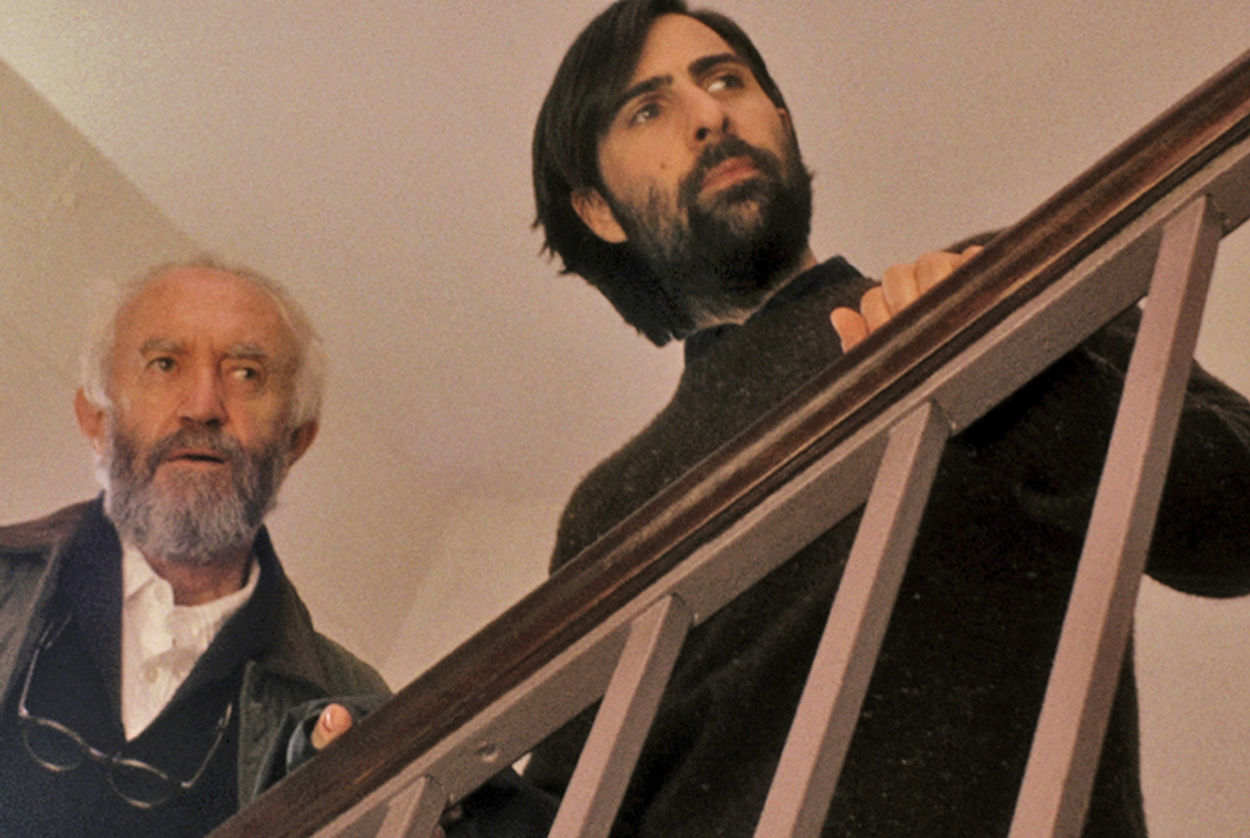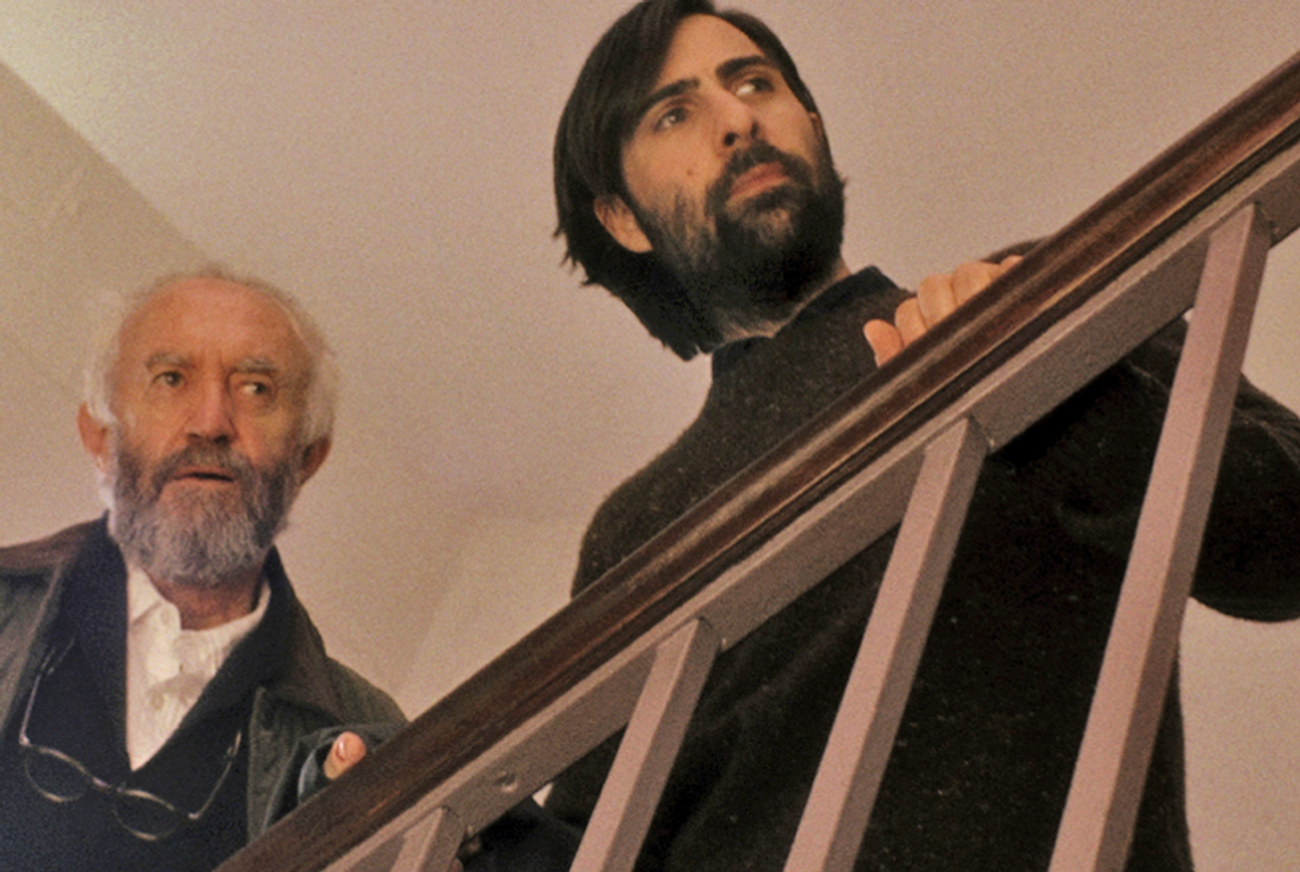Philip Roth’s Unquiet Ghost Haunts Young Writers and Makes Everyone Miserable
Alex Ross Perry’s often funny ‘Listen Up Philip’ is as much homage to as critique of the great American writer




Listen Up Philip, the third feature by 30-year-old New York independent filmmaker Alex Ross Perry, isn’t dedicated to novelist Philip Roth but it might as well be.
Allusions to the writer abound, beginning with the movie’s title—and its titles, written in the same curlicue typeface found of the covers of Roth’s early books, including Portnoy’s Complaint and My Life as a Man. References continue throughout this tale of a young and talented novelist Philip Lewis Friedman (Jason Schwartzman, fighting his innate adorability), who is also a monumentally self-involved jerk.
Asked about his interest in Roth during the Q&A that followed the Listen Up Philip press screening at the New York Film Festival, Perry declared that “his influence on me is 100 percent,” adding that he had “totally assimilated” the writer’s work and was also “a huge fan of his life.” In other words, the famously, or at least publicly, dyspeptic Roth is Perry’s hero.
Several years ago, the director made a point of citing Roth as an inspiration on his previous film The Color Wheel, a shaggy, screwball road movie featuring an incestuous pair of siblings, one played by Perry himself. I liked the film but didn’t see the connection. With Listen Up Philip, however, it’s ridiculously easy to connect the dots. Like more than a few Roth novels, Listen Up Philip has a split protagonist. The movie concerns two egotistical novelists—Philip and his self-appointed mentor, Ike Zimmerman—both of whom are defined less in terms of their writing than their relation to each other, as well as to the women they (psychologically) abuse, most elaborately Philip’s girlfriend Ashley (Elisabeth Moss)
Zimmerman (a nearly unrecognizable Jonathan Pryce) is a fearsome, belittling curmudgeon. His name echoes that of Roth’s most significant alter-ego, Nathan Zuckerman, and he follows Roth in another way—five years behind in having won the National Book Award at age 32, something Roth accomplished at 27 for Goodbye Columbus. On the other hand, Zimmerman’s vituperative complaints about writing and writers go even beyond the statements that Roth has given interviewers over the years.
Zuckerman was born as a character in a novel by another Roth surrogate, Peter Tarnopol, the protagonist of My Life as a Man, and Zimmerman, an aged, nastier version of Philip, seeks to turn the younger writer into one of his characters—or Roth’s. Early on, Zimmerman invites Philip to stay at his country retreat, a situation recalling that of The Ghost Writer, in which young Zuckerman is a weekend guest at the rural house of an older writer, in some ways modeled on Roth’s own hero Bernard Malamud. It’s an Oedipal scenario in both book and movie and, as in The Ghost Writer, the place is haunted by an enigmatic young woman, in this case Zimmerman’s daughter Melanie (Krysten Ritter).
Perry’s assorted Roth-capades are the signifier of his own ambition—they also suggest a version of the counter lives and autobiographical halls of mirrors that Roth contrived in his Zuckerman books. As engaging as Perry’s characters can be, the movie’s subtext is so strong that it becomes the text. Listen Up Philip will never be mistaken for a BBC soap opera but it is a highly self-conscious literary film. Well-written, strongly acted, and often very funny, it employs the conceit of an intermittent, omniscient narrator (Eric Bogosian) whose introductory statement parodies the one employed by Roth’s show-biz double Woody Allen to open Manhattan: “He had been living in the city for nine years and only now was beginning to think of it as home.”
Indeed, Philip is so much at home that, having just published his second novel, he sets up a meeting with an ex-girlfriend and rather than gifting her with a signed copy of the book, browbeats the woman for showing up late and insufficiently appreciating him and stalks off. Newly empowered, the novelist next confronts his college roommate, a onetime would-be writer, berating him so unmercifully for abandoning his youthful ideals that the guy is forced to flee—in his wheelchair—calling Philip a “fucking Jew bastard” as he goes. Perry is eager to establish Philip as a singularly unpleasant anti-hero—as well as a Jew.
Success has not improved Philip’s disposition. On the contrary. (See Zuckerman Unbound or Vivian Gornick’s observation that “the more fully realized the Roth narrator became—the more celebrated and lionized, loved and rewarded—the more gripped was his creator by primeval angers and grievances.”) Still, as a writer, Philip does not lack confidence. He does not seem unduly blocked. Nor does he exhibit difficulty in summoning the concentration required to write a book. (It’s as though he willed this movie into existence.) Mostly, his complaints concern a lack of recognition. At the NYFF press conference, Schwartzman recalls Perry telling him that the movie was “not about a writer, it’s about an asshole.”
A publisher’s nightmare, Philip is rude to his editors and refuses to do press. His interpersonal relations are worse. When taken up by Zimmerman, he decamps from the Brooklyn apartment he shares with Ashley, telling her, “I hope this will be good for us—but especially for me.” For a time, Perry’s emphasis shifts to Ashley (or rather to the quicksilver Elisabeth Moss) who stoop-sells Phillip’s things, endures a bar-stool pick up, and acquires a cat. This pointedly un-Rothian narrative maneuver ends when Ashley confesses that she feels Philip “weighing on me more in his absence than when he was around,” and suddenly there he is, whining for attention.
“Philip had begun to feel that the city was rejecting him,” the narrator notes. Consequently he accepts an adjunct job teaching creative writing at a college near Zimmerman’s place, where he is predictably alienated and mean to his students. (Asked by one for a letter of recommendation, he hands her a sheet of paper riddled with staples.) The college allows for the introduction of Philip’s departmental rival Yvette (Joséphine de La Baume), a parody of a determined post-structural feminist who is also more human than comparable characters in Roth’s campus novels.
Set in the early ’90s (cell phones and laptops are conspicuously absent), Listen Up Philip has many pleasing old-timey qualities. It’s fast-paced and episodic (a structure Perry attributes to Roth), with the occasionally elliptical action abetted by Keegan DeWitt’s moody jazz-inflected score. A movie of many close-ups, shot with a mobile camera on 16mm (another Perry fetish), it abruptly turns Cassavetes-like in the scene in which Zimmerman and an old friend pick up and party with a pair of middle-aged ladies.
Perry, who put in clerk-time at Kim’s Video on St. Marks Place, is a cinephile. Asked at the NYFF which movies he screened for the cast and crew, he rattled off Maurice Pialat’s corrosive We Won’t Grow Old Together, Mike Nichol’s bitter Carnal Knowledge, Woody Allen’s highly personal Husbands and Wives, and Noah Baumbach’s quasi-autobiographical The Squid and the Whale—bad break-up flicks all. Still, the film that Perry seems closest to is Baumbach’s Greenberg, which features an even more hostile and neurotic protagonist (Ben Stiller) who, in his mania for writing letters of complaint, resembles Saul Bellow’s fictional creation Moses Herzog.
Both Philip and Greenberg recall the late ’60s, early ’70s cycle of assertively dark and openly ethnic comedies whose protagonists could be characterized as “nice Jewish bad boys.” Neither Philip nor Greenberg are particularly nice but they are definitely “boys” in their refusal to accept responsibility for their deeds (Philip’s favorite expression, he tells Yvette, is “you forced my hand”), as well as difficult, recalcitrant, angry Jews
The literary analog and inspiration for Hollywood’s Jew Wave was, of course, Philip Roth. Although Bye Bye Braverman and The Producers, both of which opened during the winter of 1968, initiated the cycle, the Jew Wave had its first real hit with Larry Peerce’s adaptation of Goodbye Columbus in 1969 and its greatest disaster three years later with Ernest Lehman’s adaptation of Portnoy’s Complaint, both starring Richard Benjamin.
“Going wild in public is the last thing in the world that a Jew is expected to do,” Roth would write in 1974, the year he turned from the rowdy populism of Portnoy and Our Gang toward the studied self-reflection of My Life as a Man and the Zuckerman novels. Gone wild is one way to describe the urban neurotic anti-heroes of I Love You, Alice B. Toklas, Where’s Poppa?, The Heartbreak Kid, and several vehicles for Elliott Gould. By 1974, the Jew Wave had boiled down to Woody Allen and Mel Brooks. Not until the 21st century would another Roth novel, The Human Stain, reach the big screen with a grotesquely miscast Anthony Hopkins playing a black man passing for white.
Perry is not the only filmmaker to recognize Roth’s preeminent position in American literature. The Dying Animal was adapted as Elegy in 2008; a movie based on The Humbling, with Al Pacino and Greta Gerwig, is scheduled to open in January. When American Pastoral, currently in preproduction, arrives Roth will surpass Malamud’s five movies to become the most adapted of Jewish-American literary novelists. He’s also the only one—beside Wallace Markfield—to think seriously about movies, having had a nine-month stint as a movie/television critic at The New Republic from June 1957 to February 1958, after which he was succeeded by another literary man, Stanley Kauffmann.
Although beautifully written, Roth’s reviews were otherwise undistinguished. His taste ran to TV comedy and literary adaptations. He enjoyed poking fun at Audrey Hepburn. He showed little interest in film form, none in foreign-language movies, and, despite some attention to movies on racial issues, no discernment in Hollywood product. The exception is his favorable review of Frank Tashlin’s self-satirizing Will Success Spoil Rock Hunter? Thereafter, nada. There are reports of unproduced screenplays but, correct me if I’m wrong, the most detailed account of a movie in any Roth novel is the dinner table discussion of Deep Throat found in American Pastoral.
This Olympian indifference to or ambivalence regarding the motion picture medium gives the fantasy embedded in Perry’s movie a poignant quality. For Listen Up Philip is a not just a film about a young artist and an old one, it also is one. Perry has invited himself into Roth’s world and offered to return the favor. The movie is an homage, a critique, and a shout-out, but who knows if Philip is listening.
***
Like this article? To read Tablet Magazine’s extensive archive of material about Philip Roth, click here.
J. Hoberman, the former longtime Village Voice film critic, is a monthly film columnist for Tablet Magazine. He is the author, co-author or editor of 12 books, including Bridge of Light: Yiddish Film Between Two Worlds and, with Jeffrey Shandler, Entertaining America: Jews, Movies, and Broadcasting.
J. Hoberman was the longtime Village Voice film critic. He is the author, co-author, or editor of 12 books, including Bridge of Light: Yiddish Film Between Two Worlds and, with Jeffrey Shandler, Entertaining America: Jews, Movies, and Broadcasting.